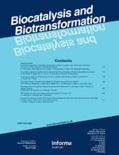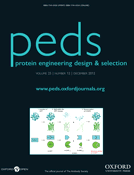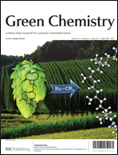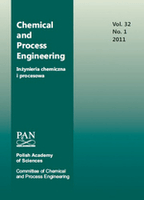
BIOCATALYSIS AND BIOTRANSFORMATION
Scope & Guideline
Pioneering Research in Biocatalysis and Environmental Solutions
Introduction
Aims and Scopes
- Biocatalysis and Enzyme Engineering:
Research on the optimization and engineering of enzymes for enhanced activity, stability, and specificity in various biochemical reactions. - Microbial Biotransformations:
Studies focusing on the use of microorganisms for the transformation of organic compounds, including the development of methods for enzyme production and characterization. - Environmental Applications:
Research dedicated to the use of biocatalysts in environmental remediation, including the degradation of pollutants and bioremediation strategies. - Industrial Biotechnology:
Application of biocatalysis in industrial processes, including production of biofuels, biochemicals, and food products, emphasizing sustainable practices. - Novel Biocatalysts:
Discovery and characterization of new biocatalysts from diverse sources, including metagenomics and synthetic biology approaches.
Trending and Emerging
- Sustainable Bioprocessing:
A growing emphasis on sustainable methods for bioprocessing, including the use of renewable resources and eco-friendly solvents, is evident in recent publications. - Nanobiocatalysts:
Research on the development and application of nanomaterials for enzyme immobilization and biocatalysis is gaining traction, highlighting innovations in enhancing enzyme performance. - Metagenomics and Bioprospecting:
There is an increasing focus on metagenomics to discover novel enzymes and biocatalysts from unexplored environmental sources, reflecting the trend towards utilizing diverse biological resources. - Deep Eutectic Solvents (DES) in Biocatalysis:
The use of deep eutectic solvents as reaction media for biocatalytic processes is emerging as a significant trend, indicating a shift towards greener solvents in biotransformation. - Enzyme Cascades and Multistep Reactions:
A notable trend towards the development of enzyme cascades and multistep reactions for complex molecule synthesis is emerging, reflecting the demand for efficient biocatalytic processes.
Declining or Waning
- Traditional Chemical Methods:
There is a noticeable shift away from traditional chemical synthesis methods in favor of biocatalytic approaches, leading to a reduced volume of papers focusing on purely chemical methodologies. - Basic Enzyme Characterization:
While enzyme characterization remains important, studies that lack a practical application or innovative approach are becoming less frequent, as the journal increasingly prioritizes applied research. - Single Enzyme Studies:
Research centered solely on individual enzymes without exploring their application in broader biocatalytic processes or systems is declining, as integrated approaches gain more attention.
Similar Journals

Biocatalysis and Agricultural Biotechnology
Bridging Biotechnology and Agronomy for Global ImpactBiocatalysis and Agricultural Biotechnology, published by Elsevier, is a distinguished journal in the fields of agronomy, biotechnology, and applied microbiology. With an E-ISSN of 1878-8181, this journal has an impressive impact factor and consistently ranks in the top quadrants of Scopus, notably Q1 in Agronomy and Crop Science and Q2 in several related categories. Since its inception in 2012, it aims to bridge the gap between biocatalysis applications and agricultural practices, fostering innovative research that advances sustainable agriculture and biotechnological applications. The journal is highly regarded, with a Scopus rank of #47 out of 406 in Agronomy and Crop Science, exemplifying its significance in the academic community. As an essential resource for researchers, professionals, and students, it provides a platform for sharing cutting-edge findings that address crucial global challenges in food security, environmental sustainability, and biotechnological advancements. Located in Amsterdam, Netherlands, the journal continues to contribute to the growth and interdisciplinary dialogue in agricultural and biological sciences.

BIOTECHNOLOGY AND BIOPROCESS ENGINEERING
Fostering Collaboration in the World of BiotechBIOTECHNOLOGY AND BIOPROCESS ENGINEERING, published by the Korean Society for Biotechnology and Bioengineering, is a prominent journal in the fields of applied microbiology, biotechnology, bioengineering, and biomedical engineering. Since its inception in 1996, this journal has served as a vital platform for researchers and professionals, facilitating the dissemination of cutting-edge research and innovative applications related to bioprocesses and biotechnology systems. With an ISSN of 1226-8372, this journal is ranked within the Q3 quartile across several categories, demonstrating its relevance and impact in the academic community. Although it operates under traditional access modalities, the journal strives to provide quality and timely insights into the advancements in bioprocess technology and microbial applications, fostering a collaborative environment for knowledge exchange. Notably, it is indexed with a respectable presence on Scopus, making it a valuable resource for students and professionals seeking the latest developments in biotechnology. For more details, kindly refer to the Korean Science Technology Center, #704 Yeoksam-Dong, Gangnam-Ku, Seoul 135-703, South Korea.

PROTEIN ENGINEERING DESIGN & SELECTION
Elevating Protein Engineering to New HeightsPROTEIN ENGINEERING DESIGN & SELECTION is a leading journal published by Oxford University Press that focuses on the intricate field of protein engineering, encompassing biochemistry, bioengineering, and biotechnology. With an ISSN of 1741-0126 and E-ISSN 1741-0134, this journal aims to disseminate groundbreaking research and innovative methodologies related to protein design and selection, enhancing our understanding of molecular biology and its applications in medicine and industry. With an established record from its inception in 1986 to the present, it maintains a significant influence in the academic community, reflected in its categorization in Q2 across various fields in its latest 2023 metrics. Although it is not an open-access journal, it offers invaluable insights and robust peer-reviewed contributions that are essential for both experienced researchers and emerging scholars in the field. The journal aspires to not only advance scientific knowledge but also to engage with real-world challenges through collaborative research and innovative practices, reinforcing its position in the evolving landscape of biotechnology and protein sciences.

BIODEGRADATION
Unraveling the complexities of organic degradation for a sustainable future.BIODEGRADATION is a leading academic journal published by Springer that focuses on the interdisciplinary study of the degradation of organic compounds and its implications for environmental health and sustainability. Operating since 1990, BIODEGRADATION has established itself as a pivotal resource in the fields of bioengineering, environmental chemistry, environmental engineering, microbiology, and pollution management, currently ranking in the Q2 quartile across these categories as of 2023. With an ISSN of 0923-9820 and an E-ISSN of 1572-9729, the journal disseminates high-quality, peer-reviewed research, engaging both seasoned researchers and emerging scholars interested in the mechanisms and applications of biodegradation processes. While the journal operates under a subscription model, it continues to attract significant interest due to its comprehensive coverage of innovative methodologies and critical analysis of biodegradation pathways and their environmental significance. As a beacon in its field, BIODEGRADATION not only addresses contemporary issues in environmental science but also fosters academic conversation and collaboration amongst researchers globally, making it an indispensable asset for those dedicated to advancing sustainability practices.

Bioresources and Bioprocessing
Transforming Bioresources into Sustainable SolutionsBioresources and Bioprocessing is an esteemed open-access journal published by SPRINGER HEIDELBERG, dedicated to the innovative fields of biomedical engineering, biotechnology, food science, and renewable energy. Since its inception in 2014, the journal has rapidly established itself as a leading platform for high-quality research, boasting a Q2 ranking in key categories such as Biomedical Engineering and Biotechnology, and an impressive Q1 status in Food Science for 2023. With robust Scopus rankings placing it in the top percentiles across multiple disciplines, Bioresources and Bioprocessing serves not only as a conduit for original research but also for critical insights into sustainable bioprocessing techniques that contribute to environmental stewardship. It is particularly aimed at researchers, professionals, and students committed to advancing knowledge in the bioprocessing sphere, promoting evidence-based innovations that leverage biological resources for diverse applications. Emphasizing open access, the journal ensures that cutting-edge research is readily available to a global audience, reinforcing its commitment to scientific communication and collaboration.

TOPICS IN CATALYSIS
Illuminating the Pathways of Catalytic DiscoveriesTOPICS IN CATALYSIS is a renowned journal published by SPRINGER/PLENUM PUBLISHERS, dedicated to advancing the field of catalysis and its applications in chemistry and chemical engineering. With its ISSN 1022-5528 and E-ISSN 1572-9028, this journal has been a critical resource since its inception in 1994, encompassing a wide range of research topics and recent advancements within the realm of catalysis, including both fundamental studies and practical applications. As of 2023, it holds a prestigious Q3 ranking in Catalysis and a Q2 ranking in miscellaneous chemistry, reflecting its impact and relevance in the academic community. With a Scopus rank of #128 in General Chemistry and #38 in Catalysis, TOPICS IN CATALYSIS is positioned to be a key contributor to the ongoing dialogue in these fields, fostering innovation and collaboration. While not an open-access journal, it provides institutional access options, ensuring that the latest findings and methodologies are available to researchers, professionals, and students worldwide. This journal is essential for those looking to stay at the forefront of catalysis research and its transformative potential in science and industry.

Synthetic and Systems Biotechnology
Unlocking Innovation Through Synthetic SystemsSynthetic and Systems Biotechnology, published by KEAI PUBLISHING LTD, is a pioneering open-access journal that has made significant contributions to the fields of applied microbiology, biotechnology, biomedical engineering, genetics, and structural biology since its inception in 2016. With an ISSN of 2405-805X, this journal is committed to fostering innovative research and interdisciplinary collaboration, providing a platform for the dissemination of high-quality studies that push the boundaries of scientific knowledge. Recognized for its excellence, it holds prestigious Q1 rankings in both Applied Microbiology and Biotechnology as well as Biomedical Engineering in 2023, alongside notable Q2 rankings in Genetics and Structural Biology. Researchers, professionals, and students alike can access cutting-edge research that explores the dynamic interplay between synthetic biology and systems biology, driving advancements that could reshape health, industry, and environmental sustainability. By operating under an open-access model, Synthetic and Systems Biotechnology ensures that new findings are accessible to a global audience, thereby maximizing the impact and reach of the published work and paving the way for future discoveries.

GREEN CHEMISTRY
Exploring the synergy between chemistry and environmental stewardship.GREEN CHEMISTRY, published by the prestigious Royal Society of Chemistry, stands at the forefront of the rapidly evolving field of sustainable chemistry. Since its inception in 1999, this esteemed journal has consistently made significant contributions to environmental chemistry and pollution studies, achieving an impressive Q1 ranking in both categories as of 2023. With a distinguished presence in Scopus rankings, positioned at #10 in Environmental Science _ Pollution and #12 in Environmental Science _ Environmental Chemistry, GREEN CHEMISTRY is recognized for its commitment to advancing research that prioritizes eco-friendly practices and innovative methodologies. The journal serves as a vital platform for researchers and professionals dedicated to promoting sustainability and reducing environmental impact through chemistry, making it an essential resource for anyone interested in the intersection of chemistry and environmental sciences. Although it does not currently offer open access, its significant impact factor highlights its relevance and authority in the field. The journal is located at Thomas Graham House, Science Park, Milton Road, Cambridge, UK, and continues to engage a global audience of scientists and students passionate about green innovations.

Current Green Chemistry
Empowering researchers to shape a greener chemical landscape.Current Green Chemistry, published by Bentham Science Publishers, is a pivotal scholarly resource devoted to advancing the field of green chemistry. With ISSN 2213-3461 and E-ISSN 2213-347X, this journal serves as a crucial platform for researchers and professionals to explore innovative and sustainable practices within the chemical sciences. The journal has demonstrated significant recognition, evidenced by its categorization in the third quartile (Q3) across various specializations including Analytical Chemistry and Inorganic Chemistry, and even a fourth quartile (Q4) in Organic Chemistry, according to the latest Scopus metrics. This indicates a growing influence in relevant fields, making it a valuable reference for contemporary environmental initiatives. The journal's accessible nature, although not open access, ensures researchers can still engage with high-quality, peer-reviewed content. Spanning an impressive converged period from 2019 to 2024, Current Green Chemistry is committed to enhancing the visibility of groundbreaking research that aligns with sustainable development objectives, making it an essential resource for anyone interested in the future of chemistry.

Chemical and Process Engineering-New Frontiers
Connecting Researchers to Propel Chemical Engineering ForwardChemical and Process Engineering-New Frontiers, published by POLSKA AKAD NAUK and the POLISH ACAD SCIENCES, is a premier academic journal dedicated to advancing the frontiers of chemical engineering and chemistry. With an ISSN of 0208-6425 and an E-ISSN of 2300-1925, this journal serves as a crucial platform for disseminating cutting-edge research and innovative practices in the field. Despite its Q4 ranking in both Chemical Engineering and Chemistry categories and a low percentile ranking in Scopus, the journal aspires to enhance visibility and impact in the scientific community through its focus on novel methodologies and groundbreaking studies. Operating as a traditional journal without open access, it aims to connect researchers, professionals, and students, fostering collaboration and knowledge exchange. With a commitment to publishing impactful research, Chemical and Process Engineering-New Frontiers plays an important role in shaping the future of chemical processes and engineering advancements.